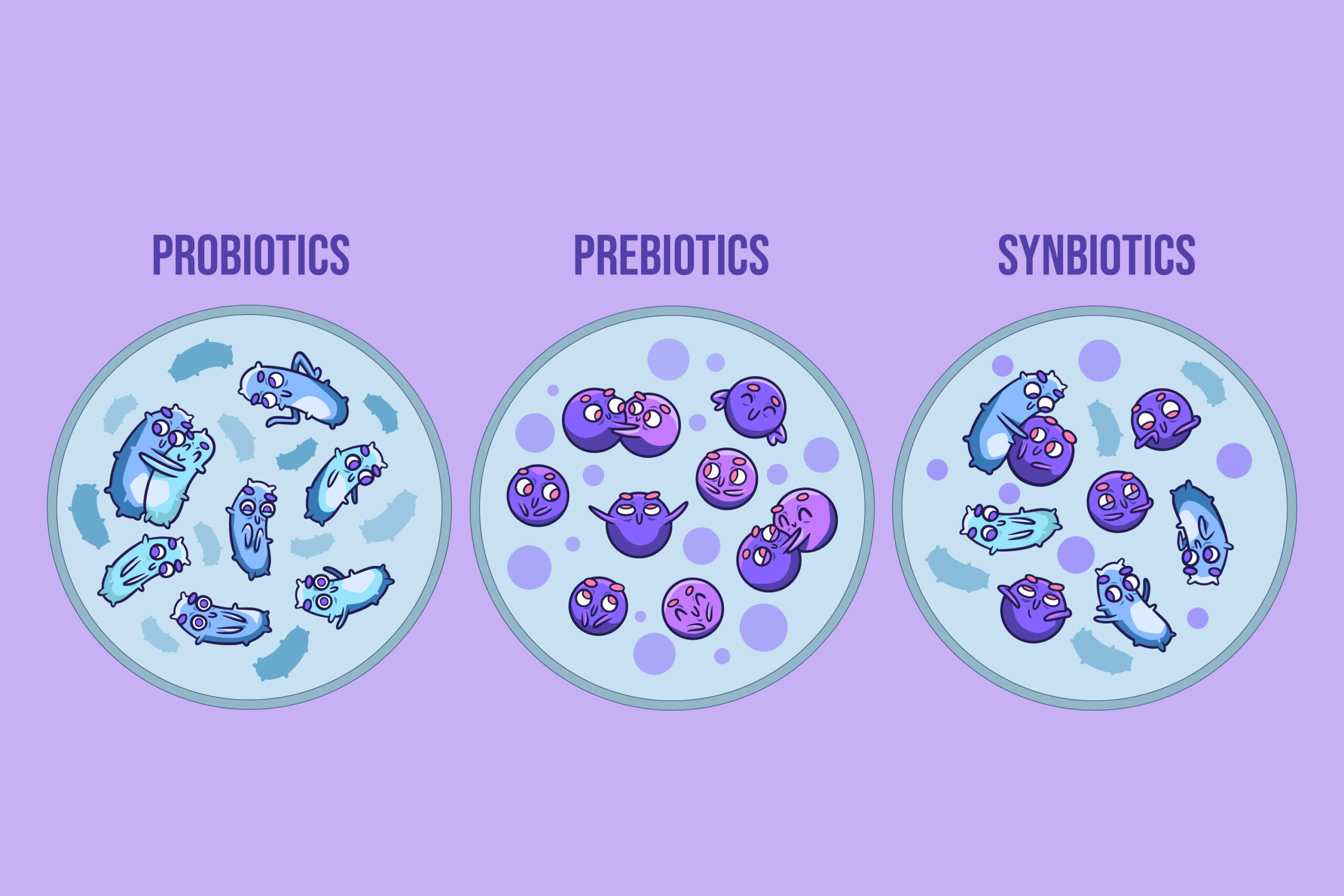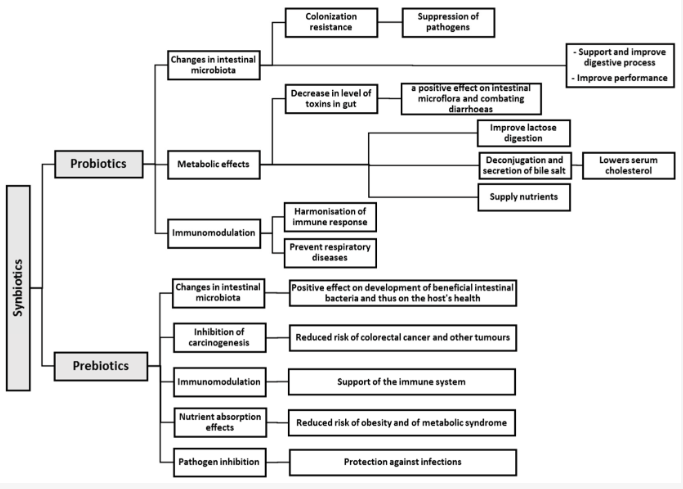Have you ever wondered why, despite eating healthy and exercising, you still struggle with bloating, indigestion, or stubborn weight? You’re not alone. Many clients come to me with similar concerns, frustrated that their efforts don’t pay off.
The truth is, the answer often lies deeper than nutrition and exercise—it’s in the gut.
Gut health is one of the core areas of well-being that I emphasize when working with clients. With so much trending content and an overwhelming number of gut health products on the market today, it’s easy to get lost in the noise.
But at the end of the day, real gut health is about balance, nourishment, and sustainability. It’s not about popping random probiotic pills or following fads—it’s about understanding what your gut truly needs and nurturing it in a way that aligns with nature.

This is where probiotics, prebiotics, and synbiotics come into play. Let’s break each of these down simply so you can understand their roles, benefits, and the best ways to add them into your daily life.
First, let’s understand the gut, your second brain…
Modern research confirms what ancient wisdom has known for centuries—the gut is often referred to as the ‘second brain.’
The enteric nervous system, a vast network of neurons within the gut, plays a critical role in regulating digestion, immune function, and even mood. This is why conditions like leaky gut, dysbiosis, and chronic inflammation don’t just affect digestion but can also lead to fatigue, anxiety, and metabolic disorders.
What are the key pillars for a healthy gut?
- Eliminating gut disruptors: Processed foods, artificial sweeteners, excessive antibiotics, and chronic stress all impact the gut flora. Identifying and removing these triggers is the first step toward healing.
- Feeding the right microbes: Gut-friendly nutrition isn’t just about avoiding bad foods; it’s about actively nourishing the good bacteria. Fermented foods, fiber-rich vegetables, and resistant starches play a crucial role in fostering a healthy microbiome.
- Mind-gut connection: Practices like deep breathing, meditation, and yoga help regulate the vagus nerve, which directly influences gut function. Stress management is a non-negotiable factor in maintaining optimal digestion.
- Hydration and movement: Water is essential for proper digestion and cleansing, while regular movement helps stimulate peristalsis, ensuring smooth bowel function.
Even when you eliminate gut disruptors, eat the right foods, manage stress, and stay active, your gut microbiome still needs the right balance of bacteria to truly thrive. This is where probiotics, prebiotics, and synbiotics come in. They go beyond just supporting gut health—they help rebuild, strengthen, and sustain a stronger microbiome. Let’s explore these!
While these foods or strategies can support your gut health, it’s important to remember that every individual’s needs are unique. Always consult with a healthcare professional before making any significant changes to your diet or routine. Your health journey is personal, but your doctor should always be part of the conversation.
What are probiotics?
When it comes to gut health, one word that’s creating waves in the health and wellness world is probiotics. But what are they, and why should you care?
Simply put, probiotics are live microorganisms—good bacteria—that help restore balance in your gut and support overall well-being.
The concept of probiotics isn’t new. In 1907, Russian-French zoologist Elie Metchnikoff observed that people consuming fermented dairy products, rich in lactic acid bacteria, lived longer and healthier lives.
Fast-forward to today, and science continues to support his observations with countless studies proving the benefits of these tiny organisms.
How do probiotics work?
Their primary role is to maintain a healthy balance between good and bad bacteria. They do this through four key mechanisms:
- Fighting off harmful bacteria: Probiotics release antibacterial substances that protect against pathogens.
- Strengthening the gut lining: They enhance and repair the intestinal barrier, preventing harmful substances from entering the bloodstream.
- Priming immunity: Probiotics stick to the gut lining and modulate the immune system to keep invaders at bay.
- Competing for nutrients: They out-compete bad bacteria by occupying binding sites and utilizing available nutrients.

Most powerful probiotic strains and their benefits:
Not all probiotics are the same. Some are more researched and widely used than others. Let’s take a look at the most effective ones:
1. Lactobacillus & Bifidobacterium: These two bacterial strains are among the most well-researched probiotics and offer a host of benefits:
- Reduce inflammation and may help manage inflammatory bowel disease (IBD).
- Strengthen immunity and may lower the risk of infections.
- Improve digestion and relieve constipation.
- Support mental health by regulating mood, stress, and sleep.
- May help lower cholesterol levels in people with dyslipidemia.
2. Saccharomyces boulardii: Unlike other probiotics, Saccharomyces boulardii is a beneficial yeast rather than bacteria. It doesn’t naturally reside in the gut, but it works wonders in correcting microbial imbalances. It’s particularly effective for:
- Diarrhea relief
- Aid in the management of Crohn’s disease and inflammatory bowel syndrome (IBS)
- May help fight Clostridium difficile infections
3. Bacillus species: Bacillus species are found in soil, air, and fermented foods. Unlike other probiotics, they don’t permanently colonize the gut but still provide powerful health benefits, including:
- Reducing respiratory infections
- Producing anti-inflammatory compounds
- Alleviating IBS symptoms like bloating, abdominal pain, and diarrhea
- Increasing the population of beneficial gut bacteria
4. Akkermansia muciniphila: Recently Dr. William Li, world-renowned physician, Harvard scientist, and NYT bestselling author, spoke about the importance of this powerful gut bacterium for metabolism, immunity, and brain health on my podcast.
- Regulates blood sugar, metabolism, and insulin sensitivity
- Enhances the immune response to cancer immunotherapy
- Lowers the risk of dementia in aging populations
Now, let’s explore some top probiotic foods for gut health…
Probiotics from fermented foods, cheese, yogurts, and buttermilk bring good bacteria straight to your gut.
- From sauerkraut and kefir to kimchi and kombucha, there’s something for everyone—whether you’re an omnivore or a vegan.
- Want to save some cash? Try fermenting your veggies at home! Carrots, radishes, or even homemade kefir can be powerful probiotic sources.
- Wish to make an extra effort? Explore these simple probiotic recipes!
- Consume these foods to boost Akkermansia growth:
- Pomegranate & Cranberries: Rich in ellagitannins that enhance gut mucus production
- Concord Grapes: Support mucus secretion in the gut
- Black Vinegar: A fermented vinegar that promotes its growth
- Rice kanji: A personal favorite that works brilliantly is rice kanji. Learn more about its benefits here.
- Take two tablespoons of the leftover white rice.
- Cool and add it to a small mud pot filled with water.
- Cover and keep it overnight. It will ferment by the following morning.
- Have two or three tablespoons of this rice or the rice water on an empty stomach.
Or try my simple 4-ingredient Indian probiotic drink:
Now let’s move to prebiotics!
What are prebiotics?
Prebiotics are non-digestible food ingredients that stimulate the growth and activity of beneficial bacteria in your gut. They help balance your gut microbiome and improve overall health.
First introduced by Glenn R. Gibson and Marcel Roberfroid, prebiotics are now recognized as a fundamental part of gut health.
How do prebiotics work?
Prebiotics provide essential nourishment for probiotics, ensuring they flourish and function optimally. Here’s how they benefit the body:
- Act as barriers to harmful pathogens, preventing their adhesion to gut walls
- Ferment into short-chain fatty acids (SCFAs), which serve as an energy source for the body.
- Prime the immune system while reducing harmful microorganisms.
- Support gut and overall health, impacting even distant organs beyond the gut.
Health benefits of prebiotics:
- Enhance antibody response to vaccines
- Lower inflammation and improve heart health
- May reduce the risk of colorectal cancer
- May lower the likelihood of allergic skin conditions
Types of prebiotics & their benefits:
1. Fructo-oligosaccharides (FOS) & Fructans: These are short-chain sugar molecules that encourage healthy gut flora. Since they are hard to digest, they ferment in the colon and act as soluble fiber.
- Promotes gut-friendly bacteria
- Strengthens immunity
- Improves digestion and nutrient absorption
- Lowers obesity-related risk
Natural Sources: Chicory root, onions, garlic, Jerusalem artichoke, asparagus, banana, wheat, barley, tomato, honey
2. Inulin: A long-chain oligosaccharide, inulin remains undigested in the upper gut and provides energy to probiotics. Due to its creamy texture, it’s also used as a fat replacement in food.
- Supports the growth of good gut bacteria
- Helps regulate blood sugar
- Lowers LDL cholesterol
Natural Sources: Leeks, asparagus, onions, wheat, garlic, oats, soybeans, chicory
3. Galacto-oligosaccharides (GOS): Derived from lactose, GOS is beneficial for both infants and adults. It helps nourish beneficial bacteria like Bifidobacteria and Lactobacilli.
- Improves stool consistency and frequency
- Enhances immune function
- Increases calcium absorption
- Strengthens gut microbiome
Natural Sources: Lentils, chickpeas, beans, green peas, cow milk
Looking for a quick and simple way to incorporate a prebiotic? Try this drink:
Last but not least, let’s discuss synbiotics!
What are synbiotics?
Synbiotics refer to a combination of probiotics and prebiotics that work together to enhance gut health.
This synergy helps maintain a balanced gut microbiome, promoting digestion, nutrient absorption, and immunity. Experts categorize synbiotics into two types:
- Synergistic Synbiotics: The probiotic and prebiotic components work together for a combined health benefit.
- Complementary Synbiotics: The probiotic and prebiotic function independently but still contribute to overall gut health.
A common example? A combination of Bifidobacterium or Lactobacillus (probiotics) with fructooligosaccharides (prebiotics).
How do synbiotics work?
Synbiotics fuel beneficial bacteria while also creating an inhospitable environment for harmful pathogens. This process results in:
- Increased levels of short-chain fatty acids (SCFAs) that promote gut health.
- Reduction of harmful substances like carcinogens and nitrosamines.
- Strengthening of the intestinal barrier, preventing infections and inflammation.
Health benefits of synbiotics
By enhancing gut microbiota, synbiotics provide a host of benefits, including:
- Stronger immunity: They regulate the immune system and reduce inflammation
- Better digestion: Helps prevent constipation, diarrhea, and bloating.
- Gut microbiome balance: Increases Bifidobacterium and Lactobacillus levels.
- Heart health: Lowers blood fat and sugar levels.
- Bone health: Prevents osteoporosis by improving calcium absorption.
- Brain and liver support: Supports liver function in cirrhosis patients and helps manage brain disorders linked to liver dysfunction.
A clear explanation of how synbiotics work and their benefits is shown below.

When incorporating synbiotics, a simple way to begin is by adding a synbiotic combination such as yogurt paired with whole-wheat cereal.
However, your gut is as unique as your fingerprint!
No two microbiomes are the same, so a one-size-fits-all approach to gut health simply doesn’t work. What your gut needs is deeply personal and influenced by your genetics, lifestyle, stress levels, and even your emotions.
That’s why relying on trends or generic gut health products may not give you the results you’re looking for. Instead, true gut healing comes from personalized nutrition and an understanding of bio-individuality—honoring what works for your body rather than following a blanket approach.
Beyond pro, pre, and synbiotics…
…your gut health is shaped by your daily habits and lifestyle choices.
- Regular movement, exercise, or yoga asanas stimulate digestion and enhance gut motility.
- Emotional well-being, including stress management, is key—chronic stress can disrupt the gut balance. You can try meditation, journaling, or even playing with mud.
- Conscious breathing techniques help activate the parasympathetic nervous system, promoting better digestion and absorption.
- And let’s not forget sleep—deep, restorative sleep allows the gut to repair and maintain a healthy microbiome.
- Do not forget, gut rest. Simply give your gut a break. While nourishing your gut with the right foods is essential, giving it time to rest is just as important. Practicing overnight gut rest (fasting for 12 hours, customizing it to suit your lifestyle, body type, and health needs) allows your digestive system to repair and reset, leading to better digestion, reduced bloating, and improved gut health.
When these elements come together, they create the ideal environment for your gut to heal and thrive. Learn more about my gut-friendly habits here.
The last word…
With 14 years of experience in holistic health and lifestyle medicine, my team emphasizes restoring gut health naturally through the right balance of probiotics, prebiotics, and synbiotics—aligned with your unique microbiome.
Probiotics introduce beneficial bacteria, prebiotics nourish them, and synbiotics ensure synergy for optimal gut function. When you personalize your gut care, you’re not just improving digestion—you’re priming immunity, balancing hormones, enhancing mental clarity, and taking control of your overall well-being.
True gut health isn’t about trends; it’s about understanding YOU!
Disclaimer: The information provided in this blog is for educational purposes only and is not intended as a substitute for professional medical advice, diagnosis, or treatment. Always seek the guidance of a qualified healthcare provider before making any changes to your diet, lifestyle, or supplement regimen, especially if you have an existing medical condition.
Struggling to find the right choices for your gut health?
We’re here to support YOU every step of the way.
Set up a one-on-one consultation with our integrative team or enroll in our specialized Gut Care Program for personalized solutions.
Reach out to us at 1800 102 0253 or write to us at [email protected].
- 1
- 2
- 1
- 2







